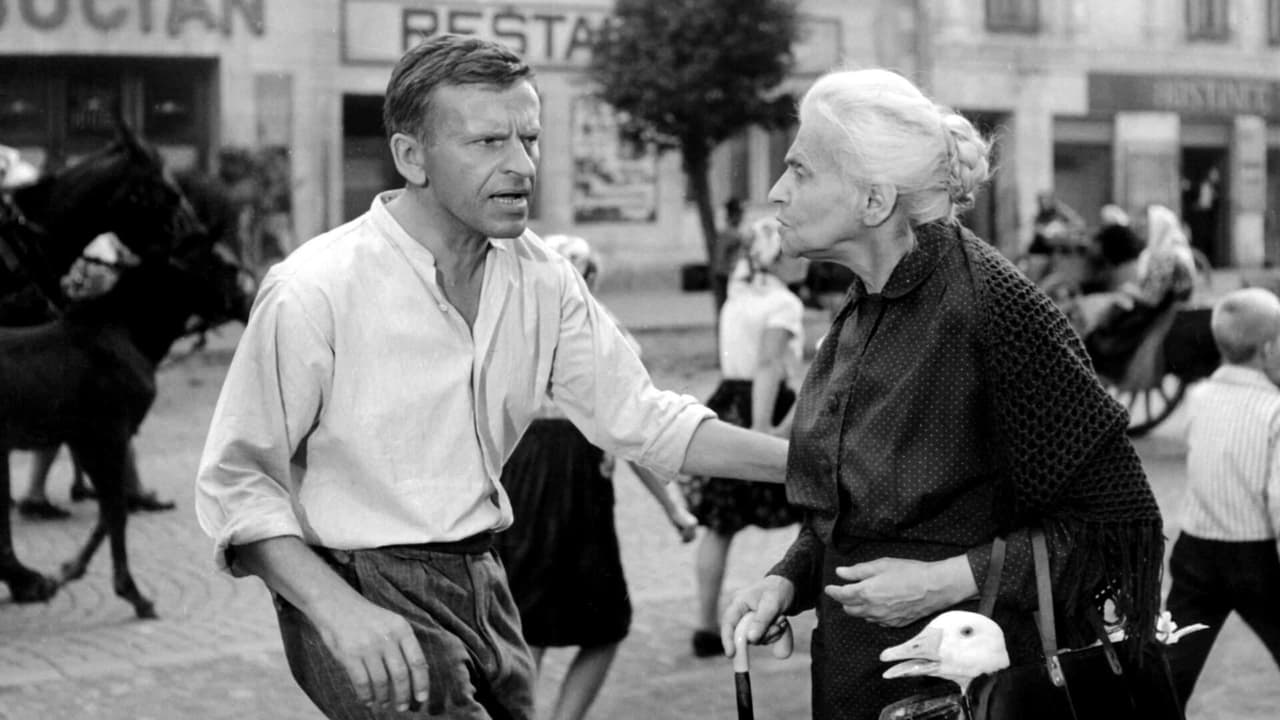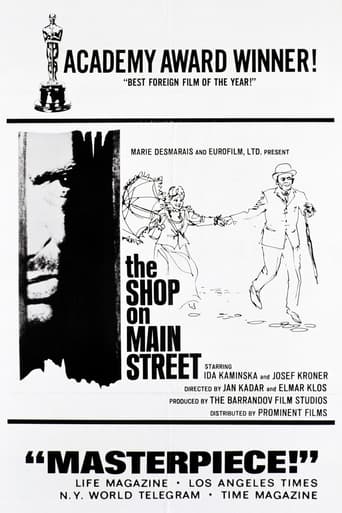Marketic
It's no definitive masterpiece but it's damn close.
Connianatu
How wonderful it is to see this fine actress carry a film and carry it so beautifully.
Asad Almond
A clunky actioner with a handful of cool moments.
Frances Chung
Through painfully honest and emotional moments, the movie becomes irresistibly relatable
Gauglini Gogini
And by breathtaking I mean literally breathtaking - while watching this movie, from time to time, especially during the last 30 or so minutes, you will realize that you are not breathing. I don't know what else to say, everything has already been said in other reviews. Naturally, I've heard about this movie before, I knew that it was the only Slovak movie to ever win an Oscar, I've read the reviews, but I was a bit hesitant to watch it because I know how badly many of the great old movies age and I didn't want to be disappointed. Well, I wasn't. This movie didn't age well, this movie simply doesn't age at all. The reason for this is that it deals with an eternal internal conflict in all humans - a conflict between what is good for me and what is moral. And what is "good" anyway? What is "moral"? What is the right thing to do? Is it always right to do the right thing? Is it always wrong to do the wrong thing? Where is the balance? Is there a balance? The main protagonist keeps asking these questions until it is too late. And most of all, he forces you to keep asking these questions yourself. You will keep asking yourself these questions long after watching this movie. And the only answer you will be able to come up with is "I don't know! I don't want to answer!" Just like Tono Brtko didn't want to answer them. It is a story of an ordinary man in extraordinary circumstances. A story of an ordinary man being forced to make a decision that no one wants to make. A decision that makes you choose between two wrong outcomes. The acting is simply perfect, there is no other word to describe it. Kaminska is perfect, Kroner is perfect and they are both perfect together. If there was an Oscar awarded for the best chemistry between two main protagonists, these two would definitely win it (and to this day I haven't seen any duo perform better).The final dream sequence is the best dream sequence I have ever seen in a movie, especially if you notice all the symbolism. It shows the contrast between what is and what could be. Between what podiums and uniforms are used for and what they could be used for. And ultimately, a contrast between the good in each and every one of us and the evil in each and every one of us.Watch this movie and you will never forget it. Trust me.
atlasmb
Those who did not live in Europe during WWII tend to have questions about what really happened during those years of Nazi influence. How can a society allow the atrocities to happen? How much did the citizenry know of the death camps and the atrocities? What psychology was at work that would allow someone like Hitler to ascend to power?Although we may not receive answers to all our questions in one film, "The Shop on Main Street" is one of a number of films that help explain. The shop in question is owned by an older Jewish lady. It is situated in a small town that is nothing special. Use of the term "Main Street" lets us know that this is supposed to be a typical street, a representative street.The story takes place during the time that nationalism and anti-Semitism are becoming synonymous in the region. Opinions that might have existed for many years are now able to be voiced in the mainstream and have even become the voice of the government.Much of the film is viewed from the perspective of Tony Brtko, a gentile who has been given the opportunity to assist the elderly shop owner. He is a simple man--one who, perhaps, would rather not contemplate questions of political philosophy or confront questions of allegiance. But such is his lot when the authorities begin to round up the town's Jews.Through the windows of the shop, which is located right on the town square, he is able to view the "outside" world as it changes before his eyes. Questions of morality are thrust upon him.The single aspect of this film that I like the most is the director's use of the camera. It gives us a POV, it moves through a window and gives us both the inside and outside views of happenings, it lingers on objects, giving them importance and making them the focus of tension, allowing us to consider what we have seen before the story continues. It wanders sometimes, seemingly making an inventory of the surroundings, perhaps following Tony's eyes as he considers his options as his options become fewer and fewer. Like most good films, it allows the camera to show us rather than have the dialogue explain to us. Note how it sometimes follows the dog going on with his "doggy life"*.This is an excellent film. Its ending is a little ambiguous, allowing the viewer to make his own interpretation or to ask questions of himself. It is worth seeing twice.*reference to Musee des Beaux Arts, by W. H. Auden.
deschreiber
I have little more to add to the praise in all the other comments here, except perhaps to suggest that some of them go too far. It's an excellent film, well worth seeing, very moving and very believable, all the more effective for the way it moves so quietly, step-by-step from common, everyday life to something more horrible. A scene that will stay with me is when all the town's Jews are gathered with their bags and suitcases in the town square, then are led off in a grim procession and disappear around a corner. No shooting, no beating, but it gives one the shivers.I did find the ending disappointing. I don't think a man like that would commit suicide. Yes, he would feel terrible about causing the death of the old lady, and he would be afraid of being beaten and killed for having harbored a Jew. But he is not a brave man--far from it. I don't think he has the firmness of will to hang himself. I think he'd run away and hide. After being found, he'd place his hopes in begging for forgiveness from his Fascist brother-in-law before taking his fate into his own hands. So the suicide struck me as conventional, too easy, just a convenient way to round off the plot.
MARIO GAUCI
This is a well-acted but somewhat overrated serio-comic human drama with a WWII backdrop; typical of Eastern European cinema at the time, the film emerges as rather slight (the grim aspects of its plot are only really felt during the last half-hour or so, making it unnecessarily long at a little over 2 hours) and is full of simple, earthy and clearly downtrodden characters - the Fascist regime standing in for the contemporary Communist oppression - who still burst into song at the drop of a hat! Even if the two main characters aren't exactly endearing (especially the rather insufferable and possibly dim-witted old Jewish lady), the ironic tragic ending packs an undeniable punch.Even though the film was taken for a poster-bearer for the nascent Czech New Wave - indeed, it went on to win the Oscar for Best Foreign Film - it is intrinsically too old-fashioned to easily fit the bill. This was the directing team's seventh (and penultimate) collaboration, after which Kadar left for the United States to continue making films there - most notably THE ANGEL LEVINE (1970) - before his untimely death in 1979.

